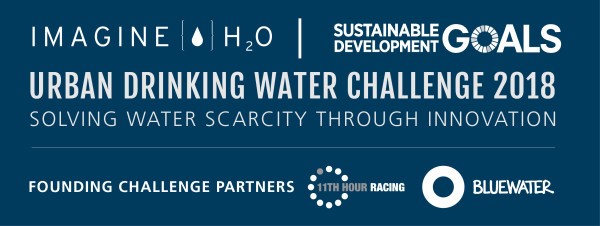
“Water, water everywhere and not a drop to drink.” As English Poet, Samuel Taylor Coleridge, states in his poem, The Rime of the Ancient Mariner first published in 1798.
And that statement has never been so true. We take for granted the fresh water that flows from our taps. We then hear the scare stories about the water not being clean and the truth is, do we really know what is in the water? What chemicals can we endure with no ill effect to our long-term health? Should we be drinking bottled water? The reality is that even as we drink from plastic bottles the plastic is being leached into the fluid and we are drinking plastic chemicals. All these questions are being asked at one end of the spectrum, in our desire to be healthy, make informed decisions and stay hydrated. There are places in the world where clean water is sadly not a given. Water scarcity is a sad reality and needs to be addressed.
The Urban Drinking Water Challenge, a global innovation competition to deploy and scale decentralized drinking water solutions for fast-growing, water-scarce cities, was created to bring together innovators and new technologies to address this issue by Bluewater and 11th Hour Racing as well as Imagine H2O.
Over 160 startups from 37 countries registered for the Challenge. The three winning companies, Drinkwell (Dhaka, Bangladesh), Microlyze (Denver, USA) and SmartTerra (Bengaluru, India), represent a diverse range of technologies and entrepreneurial approaches to solve urban water scarcity and advance U.N. Sustainable Development Goal 6.
Monday 27th August saw us celebrate the entries and the winners of this challenge, held at the world’s biggest water innovations event, World Water Week, and I was delighted to join in my role as Brand ambassador for Bluewater. The Challenge’s Founding Partners have committed up to $1,000,000 in cash prizes, pilot funding awards and investment.
“Over the next three decades, projected demand for water in cities will increase by 70% resulting in more scenarios similar to Cape Town, which is suffering acute drinking water scarcity,” says Anders Jacobson, Bluewater President and Chief Strategy Officer. “This competition unlocks the resources to validate and scale three promising solutions that prove the benefits of smarter water management in the face of rapid urbanization and looming drinking water shortages.”
“11th Hour Racing’s strategic partnerships drive innovation that tackles the challenges impacting our oceans and planet,” says Todd McGuire, Program Director of 11th Hour Racing. “At the Volvo Ocean Race stopover in Cape Town last December, we saw first-hand how drinking water scarcity is impacting quality of life and the environment in large cities around the world. This innovation challenge ties together issues of water scarcity as a result of climate change, equity issues surrounding drinking water, and plastic waste caused by limited access to clean water. We look forward to following the progress of these three winning start-ups as they tackle these issues, with the ultimate goal of supporting communities and cities build water resiliency.”
Evaluated on the basis of commercial viability, impact and market readiness, the winning startups merge technology with innovative business models to improve the reach and sustainability of drinking water services. The Challenge’s award funding will enable each winner to launch a new deployment in a water-scarce city.
Drinkwell is expanding its turnkey decentralized water purification systems across arsenic-contaminated communities in Bangladesh, focusing on the three million people in Dhaka that live in low-income communities, and are often given no choice but to drink from unsafe, illegal water sources.
Microlyze is deploying real-time water testing devices to empower households and provide cost-effective monitoring for US utilities, helping protect the estimated 22 million Americans exposed to lead and other contaminants through their water often due to aging infrastructure in cities.
SmartTerra is equipping second-tier Indian cities with the tools for data-driven decision making and operations to improve delivery and access for the underserved. Growth in these cities outpaces infrastructure improvements, and therefore water supply is often unequal leaving large segments of the population without safe and reliable access.
Imagine H2O’s evaluation committee included a diverse group of experts from institutions including the World Bank, Grundfos, The Schmidt Family Foundation, Anaergia, Rotoplas, Xylem, Aquaya Institute and Water & Sanitation for the Urban Poor.
Additionally, the Urban Drinking Water Challenge’s Evaluation Committee awarded an Honorable Mention to Majik Water, a Nairobi-based team developing an atmospheric water generation device in partnership with local communities.